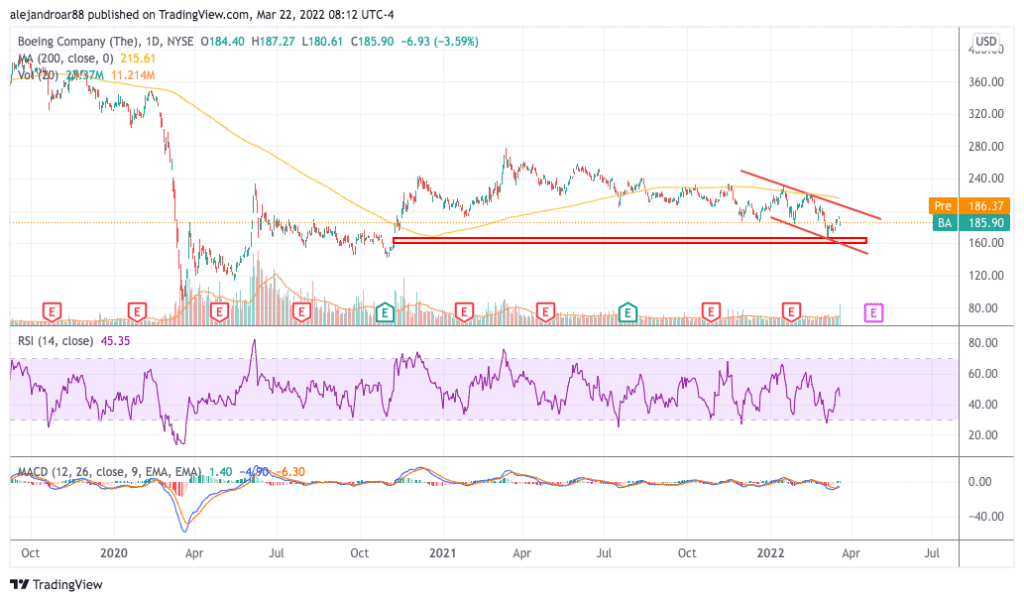Boeing Stock Down 9% in March – Time to Buy BA Stock?
Please note that we are not authorised to provide any investment advice. The content on this page is for information purposes only.
Boeing stock is down 9% so far this month following news of a fatal crash of a 737-800 airplane operated by China Eastern Airlines yesterday that led to the death of 132 passengers.
According to Chinese media, the plane may have crashed in the mountains of the Guangxi region in Southern China during cruise phase, meaning that the plane had already reached its ideal altitude.
This is the first fatal airplane crash in China in nearly a decade and it comes at a time when authorities within the Asian country were considering giving the 737 MAX another chance to fly.
China Eastern Airlines has reportedly grounded all of its 737-800 models – a total of 109 aircraft – as authorities keep investigating what happened.
Accidents during cruising altitude are considered rare and that makes the situation a bit more concerning for investors and is possibly the reason why shares of the aircraft manufacturer went down nearly 4% in yesterday’s stock trading action.
According to analysts, there is a chance that consumers will become reluctant to fly on 737 models if the cause of yesterday’s crash is attributed to software or equipment malfunctioning.
China’s President Xi Jinping got involved in the matter by asking for an immediate investigation of the crash. The fact that the matter took the President’s attention is another concerning factor for investors as China could take severe measures if authorities determine that the aircraft crashed due to technical issues.
What could be expected from this airline stock following this recent development? In this article, we will be assessing the price action and fundamentals of Boeing stock to outline plausible scenarios for the future.
67% of all retail investor accounts lose money when trading CFDs with this provider.
Boeing Stock – Technical Analysis

The price of Boeing stock has declined 7.7% so far in 2022 as the company keeps struggling to recover from the hit it took during the pandemic.
Even though Boeing’s sales are expected to climb to pre-pandemic levels this year, the firm’s balance sheet remains weaker than it was before the health crisis as Boeing was forced to take on a significant amount of debt to survive the downturn.
Meanwhile, although the virus situation may no longer be a strong headwind to the stock’s recovery, the armed conflict between Russia and Ukraine, supply chain bottlenecks, and fierce competition from Boeing’s top rival – Airbus – are still a threat to the firm’s financial performance in the near future.
The chart above shows that the price remains on a downtrend and the latest action has partially filled the open gap left behind in November back when Pfizer (PFE) revealed the efficacy of its COVID-19 vaccine.
Trading volumes yesterday were quite high as they exceeded the 10-day average by nearly 3 times. Meanwhile, momentum indicators remain bearish as the Relative Strength Index (RSI) has been steadily decreasing and is now sitting below the 50 level. Moreover, the MACD is sitting on negative territory.
Moving forward, if the November 2020 price gap is filled, nothing would prevent the stock from dropping to the lower bound of the descending price channel at around $160 per share.
This represents a 14% downside risk and such a move could be catalyzed by news coming out of China regarding the causes of this latest fatal crash.
Boeing Stock – Fundamental Analysis
During the fourth quarter of the 2021 fiscal year, Boeing reported positive operating cash flows for the first time since the pandemic started and that is a positive development that could mark a turning point in the firm’s situation.
By the end of this period, Boeing reported total cash, equivalents, and marketable securities of $16.2 billion and total debt of approximately $58.1 billion.
Back in 2019, before the health crisis, the company sold $76.6 billion and lost approximately $636 million. In 2022, analysts are forecasting that Boeing could generate around $81.3 billion in revenues but losses could accelerate amid the firm’s higher interest expenditures.
Last year, Boeing paid $2.68 billion in interest compared to $722 million the firm paid in 2019. If Boeing continues to operate at an operating loss, chances are that the firm could still report sizable losses this year and even in 2023 unless it somehow sanitizes its balance sheet.
Currently, Boeing is trading at 53 times the market’s forecasted adjusted EPS of $3.51 per share for 2021. It is a bit unclear how the company will produce such a positive figure considering the severe challenges that the business is facing amid the global supply chain crisis.
The current market capitalization of $109.7 billion results in a forward price-to-sales ratio of 1.3x that could still be a bit stretched considering the company’s highly leveraged balance sheet and its uncertain profit-generation capacity.
Moreover, this recent crash is adding up another risk to the table – a potential deterioration in the public’s perception concerning the safety of the company’s planes.
All things considered, Boeing remains a risky investment and upside potential seems rather limited and widely exceeded by the stock’s downside risk.






